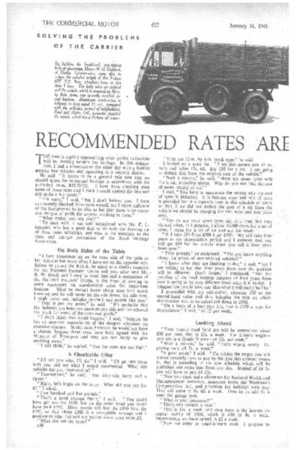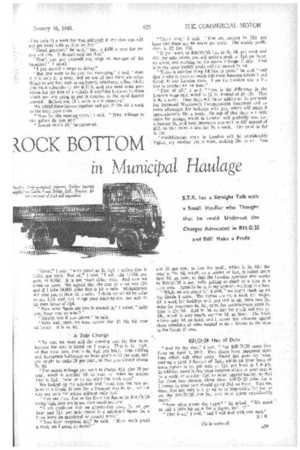RECOMMENDED RATES ARE
Page 48

Page 49

If you've noticed an error in this article please click here to report it so we can fix it.
THE time is rapidly approaching when Public authorities will be inviting tenders for haulage. In this connection, I had a conversation the other day with a haulier owning two vehicles and operating in a country district.
He said "It seems to be a general rule now that we should quote for municipal haulage in accordance with the published rates, RH/D/20. I have been checking over some of those rates and I think 1 could operate for less and still make a fair profit."
I'm sorry," I said, "but I don't believe you. I have not recently checked those rates myself, but I know sufficient of the background to be able to bet that there is no excessive margin of profit for anyone working to them."
"What makes you say that?"
"To start with, I am well acquainted with Mr. P. L. Sabatini, who has a good deal to do with the drawing up of these rates schedules, and who is the secretary to the rates and charges ,gommittee of the Road Haulage Association.
On Both Sides of the Table "1 have sometimes sat on the same side of the table as Mr. Sabatini but more often I have sat on the opposite side. Before he joined the R.H.A. he acted in a similar capacity for the National Farmers' Union and year after year Mr. R. W. Sewill and I used to meet him and a committee of the National Farmers' Union, in the hope of coming to some agreement on standardized rates for sugar-beet haulage. What he doesn't know about rates isn't worth knowing and he will never let his side down; his side now, 1 might point out, includes yourself and people like you."
"That is just my point," he said. "It's probable that Mr Sabatini has been too much on our side and has allowed too much for some of the costs and profit."
"I don't think that could happen," I said, "because he has an accurate appreciation of the dangers attendant on excessive charges. In this case, however, he would not have a chance, because these rates have been agreed with the Ministry of Transport and they are not likely to give anything away."
"I still think," he replied, " that the rates are too high."
A Charitable Offer " I'll tell you what I'll do," I said. "I'll go into them with you and see what I would recommend. What size
vehicles are you interested in?" • "Two-tonners," he said, "one drop-side lorry and a tipper."
"Right, let's begin on the lorry. What did you pay for it? " I asked.
"Five hundred and five pounds."
"That's a good average figure," I said. "You could have got one for £450, but on the other hand you could have paid £590. More people will buy the £450 than the £590, so that about £500 is a reasonable average and I propose to take that and not bother about your extra £5.
"What size are the tyres?"
438 "They are 32-in. by 6-in, truck type," he said.
I looked up a price list. "I see that covers cost £7 6s. each and tubes 17s. 6d. Say 150 for a set. I am going to deduct that from the original cost of the vehicle."
"Wait a minute," he said, "there are seven tyres with the truck, including spares. Why do you not take the cost of seven instead of six? "
I said, "You have to appreciate the reason why the cost of tyres is deducted, It is because wear and tear of tyres is provided for in a, separate item in this schedule of costs, so that if we did not deduct the cost of a set from the vehicle we should be charging for that wear and tear twice over.
"You do not wear seven tyres out at a time, but only six and when, as I propose, I allow 16,000 miles 'for a set of
• tyres, I mean for aset of six and -not for seven. •
"If I take £50 from £500 I get £450; We will take 'four years as the depreciation period and I estimate that you will get £50 for the vehicle when you sell it four 'years from now:" " Fifty pounds," he exclaimed.' "Do you know anything about the prices of second-hand vehicles?"
"I know what they are fetching to-day," I said, "but I am willing to bet that four years from now the position will be different. Don't forget," I continued, "that the position of the road haulage industry of four years from now is going to be very different from what it is to-day. I imagine few people have any idea what it will really be like."
I proceeded with My calculation, allowing £50 as the second-hand value and thus bringing the sum on which depreciation was to be calculated down to £400.
"On a basis of a four-year life, that is £100 a year for depreciation," I said, "or £2 per week..
Looking Ahead "Your annual road fund tax will be somewhere about £30 per year, that is 12s. a week. The driver's wages— you are in a Grade II area—£4 12s. per week."
"Wait a minute," he said, "that's wrong surely. I'm paying only £4 7s. a week."
"A good point," I said. "I'm taking the wages you will almost certainly have to pay by the time this contract comes in, that is according to the new schedule which will be published and come into force any day. Instead of £4 7s. you will have to pay £4 12s.
"Now you must make allowance for National Health and Unemployment insurance, insurance under the Workmen's Compensation Act, and provision for holidays with pay. That will come to 8s. 6d. a week. Then let us add 5s. a week for garage rent.
"What is your insurance?
"Thirty-two pounds a year."
"That is 13s, a week, and then there is the interest on capital outlay of £500, which js £20 or 8s. a week. Depreciation, we have agreed, is £2 a week.
" Now we come to establishment costs. I propose to allow only Ll a week for that, although in my view you will not get away with as little as that."
"Good gracious," he said, "that is £100 a year for the two vehicles. It doesn't cost me that."
"Don't you pay yourself any wage as manager of the business?" 1 asked.
"1 pay myself a wage as driver."
"But you want to be paid for managing," I said, "even if it is only El a week, and on top of that there are other things to pay for, such as stationery, telephone, office, whilst you must subscribe to the R.H.A. and you need some provision for the hire of a vehicle if anything happens to hese which you are going to put in contract to the rural di trict council. Believe me, £1 a week is not excessive."
We added these figures together and got £9 18s. 6d. a week as the total fixed costs.
"Now for the running costs," I said. "What mileage to the gallon do you get?"
"Round about 10," he answered. "That's easy," I said. "You are making Is. 31d. per hour and there are 44 hours per week. The weekly profit, then, is £2 16s. 10d.
"If you work to RH/D/20, i.e., at 6s. 6d. per week and 41d. per mile excess, you will make a profit of lid. per hour, no more, and nothing on the excess mileage, if any. That is to say, your weekly profit will not exceed 5s. 6d.
"There is another thing I'd like to know," he said, "and that is why is there so much difference between Grade 1 and Grade II and London rates. I see the London rate is 7s.; that is another 6d. an hour."
"First of all," I said, "there is the difference in the London wage rate, which is £5 Is. instead of £4 12s. That is 9s. a week. Then there will be an additional Is. per week for increased Workmen's Compensation Insurance and an extra allowance for holidays with pay, which will make it approximately 10s. a week. On top of that there is a little extra for garage, which in London will probably cost you a further 3s,, and your, insurance rate will be £45 instead of £32, so that there is another 5s. a week. The total so far is 18s.
"Establishment costs in London will be considerably higher, say another 10s. a week, making 28s, in all. You












































































